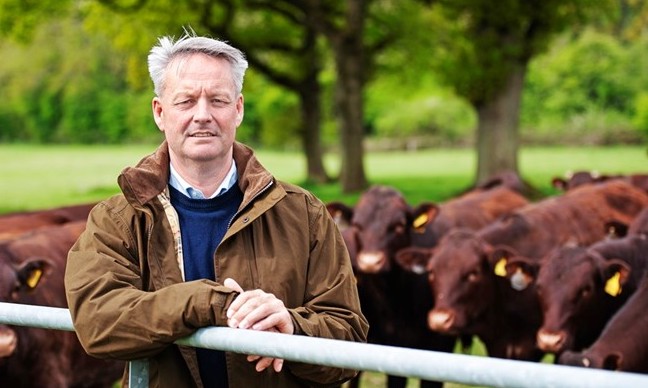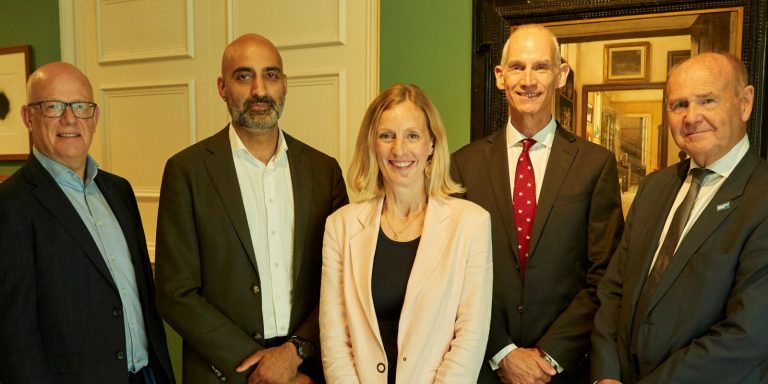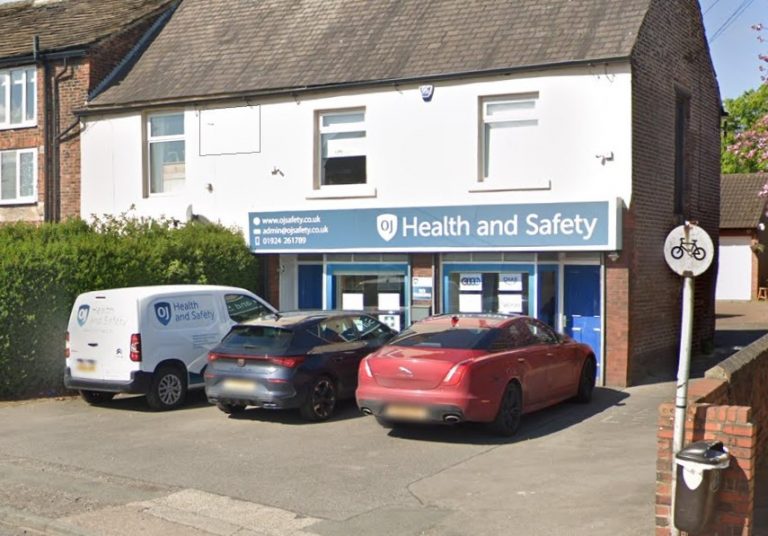In its 2023 Rural Crime Report the insurer revealed that rural crime cost the UK an estimated £49.5m in 2022, up from £40.5m the previous year.
The rise comes against a background of soaring values and the low supply of farm machinery worldwide. Criminal gangs have responded by establishing illicit global markets for farm machinery and technology equipment.
As a result, the UK cost of agricultural vehicle theft reported to NFU Mutual soared by 29% to £11.7m in 2022.
A survey of 175 NFU Mutual agents, who are based in rural communities across the UK, found 70% knew farmers who had been repeat victims of rural crime. And 86% said thieves are cashing in on the limited supply of vehicles and rising prices.
NFU Vice President David Exwood said: “As the NFU Mutual’s report highlights, over the past 18 months, highly organised gangs of criminals have continued to plague the British countryside, stealing livestock, high-value farm machinery and expensive GPS equipment, as well as trespassing on private land and regularly fly-tipping tons of rubbish.
“The huge increase we’ve seen in criminal activity is significantly impacting farm businesses and farming families both financially and emotionally, with many rural communities left feeling vulnerable and intimidated.
“All at a time when the industry is facing numerous other pressures, not least soaring production costs.”
Cost of rural crime has soared by £9m a year, says insurance company
David Lloyd Leisure fined £2.55m after drowning at venue in Leeds
David Lloyd Leisure Club Limited has been fined £2.55 million and ordered to pay £258,355.80 in costs at Leeds Crown Court after a three-year-old boy drowned at the the company’s Club in Moortown, Leeds.
During the investigation health and safety inspectors for the council identified inadequate lifeguarding arrangements at the club over a number of years, leading up to the tragic event.
The investigation found that David Lloyds Leisure had been exposing club members to risks contrary to Section 33(1) of the Health and Safety at Work etc. Act 1974, between September 1, 2015, and April 22 2018 in the David Lloyd Leisure Club.
Leeds City Council environmental health service are responsible for regulating health & safety standards across a wide range of commercial sectors including retail, wholesale distribution, hotels and catering, offices, and leisure industries.
Councillor Mohammed Rafique, Leeds City Council executive member for climate, energy, environment and green space, said: “I would like to begin by offering the councils sincere condolences to the the Wright family, this tragic story underlines the importance for employers and duty holders to ensure that the safety of their employees and customers is a priority.
“I would also like to thank the council’s environmental health and legal teams, and the Barristers from St Paul’s Chambers for their dedication and hard work to ensure David Lloyd Leisure Limited were held accountable for their failings.
“The council will always look to work with and support businesses to meet their legal duties, however we won’t hesitate to take enforcement action in cases of serious and prolonged noncompliance.”
Greater Lincolnshire gets regional ‘defence and security’ status
Greater Lincolnshire is now recognised by the Government as the third of the nation’s new Regional Defence and Security Clusters.
The announcement has come from the Defence and Security Accelerator, created by the Government to accelerate innovation in defence and security in order to keep the UK safe and prosperous.
Established by the Greater Lincolnshire LEP, the cluster will support innovation in the field of intelligence, surveillance, target acquisition and reconnaissance.
The ambition is to establish Greater Lincolnshire as a national defence and security innovation, production and service hub and to promote the area’s ability to develop and support vital defence and security programmes.
John Ridge, Director of Defence Innovation at the MOD, said: “Lincolnshire has a long history of manufacturing, research, development, and innovation expertise to generate military capability for the UK and a solid link to innovation and collaboration between MOD and industry.
“The Greater Lincolnshire RDSC lands in the middle of that rich Lincolnshire innovation environment with a key focus on technologies supporting the ISTAR force at RAF Waddington and data science and has positioned itself well to extend that regional contribution.
“It is the MOD’s aspiration that as well as supporting the development of defence and security capabilities for the UK, RDSCs will to promote our ability to develop and support programmes to increase regional wealth through greater public and private inward investment and the creation of high-value, better paid jobs.”
Anita Friend, Head of the Defence and Security Accelerator, said: “In supporting the creation of Regional Defence and Security Clusters in the Defence and Security Industrial Strategy, the MOD and especially my team within DASA recognised that collaboration between the established industry suppliers, SMEs and academia, supported by regional partnerships, was key to increasing the diversity in the regions to develop, exploit and commercialise advanced innovation for defence and security.
“The Greater Lincolnshire Defence & Security Cluster will have a vital central role in fostering that collaboration for Lincolnshire and as part of the growing network of regional clusters.”
Major General Julian Free CBE, Deputy Vice Chancellor at the University of Lincoln and Chair of the Greater Lincolnshire LEP Defence and Security Board, said: “Today marks an important milestone for the region as the culmination of a lot of work to connect the regional defence and security sector SME, prime contractor and supply chain community, to raise the profile of the tremendous innovation they are driving to meet the challenges of today and tomorrow, and to promote the opportunities for other companies to locate or expand here as part of the cluster.
“It also provides a springboard for individuals to pursue exciting and rewarding high-tech, high-value careers in Greater Lincolnshire.”
The other two existing clusters are the South West RDSC and the Three Counties RDSC in the West Midlands.
Sentiment stable and output falls while SME manufacturers’ investment plans scaled back
Sentiment among SME manufacturers was stable for a second successive quarter in July, though this represents a relative improvement compared with the sharp declines seen 2022 and in early 2023, according to the CBI’s latest SME Trends survey.
Output declined for a fourth successive quarter in the three months to July. Total new orders also fell moderately, though the volume of total orders books was stable at a level deemed “below normal.” Both output and new orders are expected to grow moderately in the three months to October.
Supply-side constraints to output continue to diminish, though the share of firms citing labour shortages as a limit on output over the next three months remained historically high, as did the share citing the availability of materials or components. A rising share of SMEs (almost two-thirds) cited orders or sales as a constraint on output.
SMEs have scaled back investment plans. Capital expenditure on buildings and on plant & machinery is expected to fall in the year ahead, with rising shares citing the availability of internal finance and the cost of finance as factors likely to limit capex. Spending on product and process innovation is also expected to decline, while training expenditure will be held steady.
Ben Jones, CBI lead economist, said: “Sentiment among SME manufacturers remains subdued, with output and new orders falling over the last quarter. Worryingly, investment intentions for the year ahead have weakened across the board in the face of uncertain demand, persistent labour shortages and, increasingly, higher finance costs as interest rates rise.
“In a challenging environment for manufacturing investment, confidence-building measures have a big role to play, whether that’s scaling up Made Smarter into a national programme or providing clearer signals of intent over the UK’s response to the US Inflation Reduction Act and the EU’s Green Industrial Plan.”
Yorkshire food and drink businesses offered interest-free 12-month loan
The York and North Yorkshire Growth Hub has started to promote a Loan to Equity scheme for food and drink businesses in its area.
Under the scheme firms can apply for an interest-free loan of up to £100,000 over a 12-month term without any monthly repayment obligations. When the loan matures, it can either be fully repaid or converted into equity in the candidate’s business, subject to the lender’s discretion.
It’s said that the scheme offers a valuable source of funding at zero cost, enabling firms to develop and scale their operations. Additionally, throughout the loan period, the businesses will receive valuable business support. A successful outcome involves the conversion of the loan into equity at the end of the 12-month term. Such a conversion also serves as a strong indicator of the investor’s willingness to provide future equity-based investments on the loan anniversaries in subsequent years.
The Loan to Equity scheme is open exclusively to high-potential UK-based Food and/or Drink manufacturing businesses engaged in retail or direct consumer sales. To be considered, candidate businesses must demonstrate a compelling consumer proposition and a well-defined business plan. They should have progressed beyond the initial developmental stages and be ready to scale. They must also be:
Key details of the Loan to Equity scheme are as follows:
- Registered in the UK
- Owner-operated
- Engaged in Food and/or Drink industry
- Have a consumer-branded product
- Annual turnover up to £4 million
- Present a compelling business plan with ambitious growth targets
- Be in operation for five years or less since incorporation
- Provide evidence of consumer demand for their brand
- Eligible businesses can receive a secured interest-free loan for a 12-month period, with a maximum value of £100,000, upon successful completion of the application (including the business plan). The ultimate goal is to convert the loan into an equity stake when it matures. For investment purposes, the company’s valuation will be based on 5 times EBIT (Earnings Before Interest and Taxes).
- Throughout the loan period, borrowers will benefit from professional advice from the lender to help them achieve their company goals.
- Monthly meetings between the lender and the borrower will be held to review company performance, plans, and progress.
- At the 6-month mark, the lender will inform the borrower of their intention to either call in the loan upon maturity or convert it into equity at the end of the 12-month term, based on a valuation of 5 times EBIT.
- Successful conversion of the loan to equity will grant the investor the right to appoint a Director to the invested business.
- Moreover, the successful conversion opens the pathway for future equity investments in the business, if desired by both parties, on the 2nd, 3rd, 4th, and 5th anniversaries of the original loan. The company’s valuation for these subsequent investments will also be based on 5 times EBIT on each anniversary.
Cheers! Pub beer price duty now 11p a pint lower than supermarkets
More than 38,000 UK pubs and bars have seen a tax cut on the pints they pull from now on as the duty paid on drinks on tap in pubs will be up to 11p lower than at the supermarket.
The changes are designed to help pubs compete on a level playing field with supermarkets, so they can continue to thrive at the heart of communities across the UK. The Brexit Pubs Guarantee announced in the Chancellor’s Spring Budget secures the pledge that pubs will always pay less alcohol duty than supermarkets going forwards.
It comes as other landmark changes to the alcohol duty system also come into effect today, which see drinks taxed by strength for the first time and a new relief – named Small Producer Relief – to help small businesses and start-ups create new drinks, innovate and grow.
The changes have automatically lowered the duty in shops and supermarkets on many of the UK’s favourites including certain bottles of pale ale, pre-mixed gin and tonic, hard seltzer, Irish cream, coffee liquor and English sparkling wine, amongst others.
Prime Minister Rishi Sunak said: “I want to support the drinks and hospitality industries that are helping to grow the economy, and the consumers who enjoy the end result.”
The lower alcohol tax for draught beer result from the expansion of Draught Relief, which effectively freezes or cuts the alcohol duty on the vast majority of these drinks. The government has pledged that the duty pubs and bars pay on these drinks will always be less than retailers, known as the Brexit Pubs Guarantee.
This tax reduction is part of a wider shake up of the alcohol duty system which also comes into effect from today – the biggest in 140 years.
The key changes are:
- all products taxed in line with alcohol by volume (ABV) strength, rather than different duty structures for different drinks
- fewer main duty rates, from 15 to 6, to make it easier for businesses to grow and operate
- there will be lower taxes on lower alcohol products – those below 3.5% alcohol by volume (ABV) in strength – a huge growth area in the drinks industry
- all drinks above 8.5% ABV will pay the same rate regardless of product type
Government changes CE marking rules to ease business burden
The Department for Business and Trade is to extend indefinitely the use of CE marking for businesses, applying to 18 regulations owned by the department.
This comes as part of a wider package of smarter regulations designed to ease business burdens and help grow the economy by cutting barriers and red tape. Following extensive engagement with industry, British firms will be able to continue the use of CE marking alongside UKCA.
The Business Secretary acted urgently on this issue, to prevent a cliff-edge moment in December 2024 when UKCA was set for entry. This intervention will ensure businesses no longer face uncertainty over the regulations and can cut back on unnecessary costs freeing them up to focus on innovation and growth.
Business Minister Kevin Hollinrake said: “The Government is tackling red tape, cutting burdens for business, and creating certainty for firms – we have listened to industry, and we are taking action to deliver. By extending CE marking use across the UK, firms can focus their time and money on creating jobs and growing the economy.”
Tina McKenzie, Policy Chair of the Federation of Small Businesses said: “It’s welcome to see the continued recognition of CE marked products. This will allow time for small firms to adjust to the UKCA marking system and focus on growing their business both at home and overseas.”
Stephen Phipson, CEO of Make UK, the manufacturers’ organisation said it was a pragmatic decision. “Manufacturers will very much welcome and support this move. It will help safeguard the competitiveness of manufacturers and aid the UK as a destination for investment. It should bring more confidence about doing business in the UK and recognises the need to work with the reality of doing business. Make UK has worked extensively with UK Government pushing hard for this decision and we are pleased the ongoing engagement has delivered this positive outcome.”
The extension will provide businesses with flexibility and choice to use either the UKCA or CE approach to sell products in Great Britain.
Health and safety specialist receives substantial investment
OJ Health and Safety Solutions has received substantial investment from Newable Compliance in a transaction overseen by Charles Needham, KBS Corporate deal executive.
Ossett, West Yorkshire-based OJ is a health and safety specialist, providing training, consultancy and assessment services to national clients.
Since its formation in 2007, the business has developed its retained service package, encompassing one-to-three-year agreements to deliver 24-hour support.
Additional services provided by OJ include asbestos surveys, fire safety, health assessments and comprehensive accident investigations.
Charles Needham advised: “Much of OJ’s value came from its potential. The shareholders had been growing the business exponentially over the last few years with limited marketing efforts.
“The majority of OJ’s turnover was on a contracted basis, and when comparing this to the profit margins achieved by the business it was a very appealing opportunity.”
Founders Kelly and Neil Denning were looking for the right buyer that would provide the necessary resources for future growth while enabling them to retain an interest in the business.
Newable Compliance has acquired a majority stake in OJ to expand its investment portfolio. The organisation provides long-term strategic investment to businesses focused on supporting SMEs in meeting their compliance obligations.
To fulfil its ongoing goals, Newable Compliance intends to invest in three to four businesses on an annual basis.
Neil Denning commented on the deal: “Since OJ’s establishment in 2007, our mission has been to offer a streamlined solution for both SMEs and large organisations in need of a reliable and straightforward safety partner.
“Now, with the backing of Newable Compliance’s investment, we are poised to extend our service to a wider audience of SMEs seeking to fulfil their health and safety obligations. This strategic partnership enables us to provide an even greater number of businesses with the necessary tools and guidance to navigate the complex landscape of health and safety.”
Bruce Gordon, co-chair of Newable Compliance, said: “We are thrilled to embark on a collaborative partnership with the team at OJ. Together, we aim to accelerate the growth of the business. By joining forces, we can leverage our collective expertise to scale the business, broaden its reach and enhance the delivery of innovative health and safety solutions.”
Charles Needham added: “It was enjoyable working alongside Newable Compliance during this transaction. I was extremely pleased with how they conducted themselves as a purchaser and would love to work with them again.
“I am delighted with the outcome of the sale and to have been involved in the process. By working with Kelly and Neil through negotiations, we secured a deal that fairly reflected the value of their business.”
During the sale, OJ was supported by Guvvy Sandhu and James McKimm of Mackrell Solicitors.
Creative agency takes space at Leeds’ Elbow Rooms
Creative agency, Us Studio has let an office suite at the recently refurbished Elbow Rooms on the corner of Briggate and Call Lane, Leeds.
The owners of the prominent mixed-use property have just completed an extensive refurbishment of the building in order to provide a contemporary and characterful office environment.
Us Studio signed a new lease on the second floor 1,150 sq ft Suite 2.
Carter Towler are joint agents with WSB.
Carter Towler’s James Jackson said: “The Elbow Rooms office suites are amongst some of the most appealing smaller offices on the market here in Leeds.
“The combination of the excellent location right in the heart of the vibrant southern quarter of the city centre, the excellent facilities, and the flexible, all-inclusive, fully fitted lease deals which we can offer here make for a very enticing proposition.
“We are delighted that Us Studio has chosen to move its business here, the creative agency is a perfect addition to the growing community of enterprising young businesses now in residence. There is just one suite remaining, but we don’t think it’ll be available for much longer!”
Nicholas James acting on behalf of his family property company added: “This building has a fantastically rich history and we wanted to honour that whilst adding lots of contemporary enhancements.
“So, in addition to making the most of many of the traditional features, we have embraced modern office trends by providing fully fitted ‘plug and play’ offices with additional benefits such as the creation of Zoom/meeting rooms and incorporation of bicycle storage and showers.”
Business confidence falls in Yorkshire
Business confidence in Yorkshire fell seven points during July to 38%, according to the latest Business Barometer from Lloyds Bank Commercial Banking.
Companies in Yorkshire reported lower confidence in their own business prospects month-on-month, down 12 points at 36%. When taken alongside their optimism in the economy, down three points to 39%, this gives a headline confidence reading of 38%.
Yorkshire businesses identified their top target areas for growth in the next six months as investing in their teams (40%), evolving their offer (39%) and introducing new technology (30%). The Business Barometer, which surveys 1,200 businesses monthly, provides early signals about UK economic trends both regionally and nationwide. A net balance of 21% of businesses in the region expect to decrease staff levels over the next year, down six points on last month.
Overall, UK business confidence dipped by six points to 31% in July, with nine out of 11 regions and nations reporting a lower confidence reading month-on-month.
Optimism in the economy has also fallen, dropping 11 points to 21%, the lowest levels since February this year.
However, firms remained resilient in their own trading prospects, with 43% of companies expecting business activity to increase over the next 12 months, up one point on last month and reaching a 14-month high.
Despite the fall in overall confidence, levels remain higher than the survey’s long-term average reading of 28% and every UK region and nation reported a positive confidence reading in July. The North East reported the highest levels of business confidence at 43% (down four points on last month), followed by Yorkshire and the West Midlands (up two points month-on-month) both at 38%.
Retail was the only broad sector registering higher confidence (up six points to 35%), mostly reflecting stronger transport services.
The fall in overall business confidence this month was led by the service sector sentiment falling by seven points to 30%. While the fall in confidence was seen broadly across this sector, hospitality firms appeared to be more resilient.
Confidence also was lower in manufacturing (down 16 points to 34%) and construction (down eight points to 31%).
Steve Harris, regional director for Yorkshire at Lloyds Bank Commercial Banking, said: “Although high inflation persists, signs of it starting to ease is welcome news to businesses who’ve been navigating its challenges for many months.
“From speaking to many businesses on the ground, I know that they’re now starting to plan around future growth opportunities. Many see expanding their workforce and investing in their teams as a way of achieving their ambitions, which will bring an appreciated boost to the local economy.
“As firms invest in their workforce, it’s important they keep a close eye on their working capital and free up funding to support them as they train and develop the skills they need to grow.”
Hann-Ju Ho, senior economist, Lloyds Bank Commercial Banking, said: “The Barometer presents a complex picture for firms this month, with the data showing that trading prospects remain strong with businesses feeling under less pressure by inflation to raise prices.
“However, there is clearly uncertainty about the wider economy and rising interest rates. This may be causing net hiring intentions to moderate slightly. Nevertheless, wages and jobs growth continue to support staff with the current cost of living.
“However, the sectoral analysis this month shows some positive signs for the retail sector, while there are indications that pent-up demand may be boosting confidence in tourism and travel. As businesses continue to adapt to the economic environment, we expect to see ongoing resilience broadly across all sectors.”











